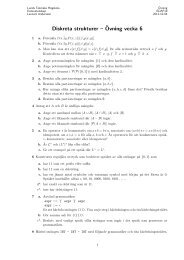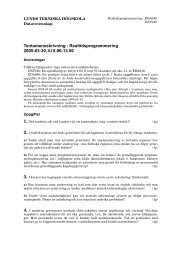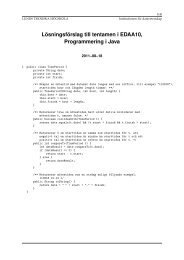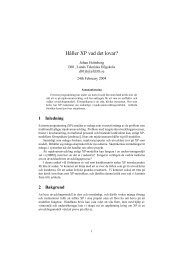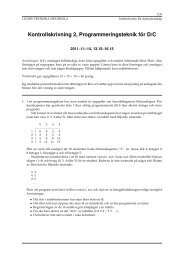JAVA-BASED REAL-TIME PROGRAMMING
JAVA-BASED REAL-TIME PROGRAMMING
JAVA-BASED REAL-TIME PROGRAMMING
Create successful ePaper yourself
Turn your PDF publications into a flip-book with our unique Google optimized e-Paper software.
3. Multi-Threaded Programming<br />
public void run() {<br />
while (!isInterrupted ()) { // !interrupted() OK in most cases.<br />
// here is where the actual code goes....<br />
}<br />
} // End of life for this thread.<br />
After the loop, isInterrupted can be used to check how the loop was exited.<br />
Instead of terminating after an interrupt, you can have an outer loop to restore<br />
the state and continue execution. Additionally, you may need to catch<br />
InterruptedException, or other Throwable objects such as those of type Error,<br />
either outside the while loop above or at several places inside that loop depending<br />
on the code. Note, however, you should normally not try to catch<br />
and recover from an InterruptedException thrown from a blocking call that<br />
have to do with access or allocation of shared resources/data, if resources are<br />
not left in a consistent state (bank transaction not half made, etc.). When<br />
resuming normal operation after such a call has been interrupted, there is a<br />
big risk that execution continues as if resources where locked even if that is<br />
not the case. Having each method to pass the exception (instead of catching<br />
it locally) to the caller, by appending throws InterruptedException to its signature,<br />
messes up the code too much. In practice, the result is often empty<br />
catch-clauses with an intention to add the code later, which then never is<br />
done and the application silently compiles and runs, but interrupting it may<br />
result in disaster. The recommended approach therefore is to always convert<br />
an InterruptedException to an Error. For this purpose, we will later use the<br />
class RTInterrupted which is a subclass of Error with some enhancements:<br />
try {<br />
argout = methodThrowingInterruptedException(argin);<br />
} catch (InterruptedException exc) {<br />
throw new RTInterrupted(exc.toString ());<br />
}<br />
which means that the method containing the above code is not defined to<br />
throw any InterruptedException, and the caller(s) of that method do not<br />
need to be cluttered with try-catch clauses. Recall that the intended use of<br />
the Error class is for throwing severe exceptions that the user is not expected<br />
to catch, but he/she can catch them if that is needed. Hence, throwing an<br />
error when a resource allocation request is interrupted agrees well with the<br />
Java API conventions.<br />
A different case is when an independent sequence of operations is to be<br />
interrupted. Sequencing on an application level (that is, advancing the state<br />
of the application, not caring about advancing the program counter for each<br />
instruction) is typically done by waiting for time to pass, or on certain conditions<br />
to be true. Interrupting such a thread, and letting the interrupted<br />
thread handle the Exception/Error, can be a perfectly acceptable thing to do:<br />
• If the interrupted sequence is a web-server transaction, closing files and<br />
returning any resources in their initial state should be possible and<br />
straight forward.<br />
52 2012-08-29 16:05






